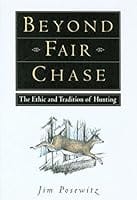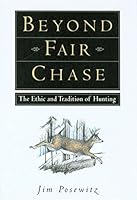Beyond Fair Chase
Published:
Beyond Fair Chase

Metadata
- Author: Jim Posewitz
- Full Title: Beyond Fair Chase
- Category: #books
Highlights
- Doing right, at the critical moment, was more important than killing a fine bull elk. There was a doubt, so the boy did not shoot. In time he would realize that the hunt had already been fulfilled. (Location 121)
- To pass up the chance to kill your first because of a small doubt about whether or not everything is absolutely right remains the teacher’s trophy. It is part of being an ethical hunter. (Location 123)
- The most important measure of hunting success is how you feel about yourself—how you feel when you think about and plan your hunting trip, when you are hunting, when you kill, when you tell about it, and when you remember each experience. (Location 139)
- First, the opportunity and privilege to hunt is yours by virtue of your citizenship. Second, the animals you hunt are the result of conservation efforts of recreational hunters who stopped the market hunting and commerce in wildlife. Third, these early hunters began the restoration and conservation of wildlife that continues to this day. Fourth, as a hunter, you have a responsibility to future generations to see to the conservation of the animals you hunt. Fifth, you have the responsibility to be a safe and ethical hunter. (Location 176)
- A person who knows and respects the animals hunted, follows the law, and behaves in a way that will satisfy what society expects of him or her as a hunter. (Location 197)
- As you learn about animals, you will also learn that the presence of hunters in the animal’s world is natural. A hunter is a predator participating in a world where predation belongs. Just as predators “belong” to the natural system, an ethical hunter also “belongs” to the natural system. That sense of belonging becomes real when you hunt. (Location 212)
- We have all heard stories of hunters who suffer “buck fever.” The pattern of this “fever” is that a hunter has the opportunity to shoot an animal, but in the excitement of the moment, everything goes wrong. Easy shots are missed, ammunition is unloaded without being fired, or the hunter is “frozen” as an opportunity presents itself and then vanishes. In the worst circumstance, wild shots are taken, animals are wounded, and other hunters are placed in peril. This is not a “fever” but a hunter who is not prepared. At this point the lack of preparation can result in unethical behavior. (Location 227)
- The first—to determine whether your firearm is shooting accurately. The second—to learn to hit your target consistently. The third—to develop confidence that you are going to hit where you are aiming. (Location 310)
- When hunting, the ethical hunter squeezes the trigger to hit the animal. The ethical hunter does not pull the trigger to find out if he or she can hit the animal. (Location 315)
- If you miss your best opportunity, the ethical choice is to either get a better opportunity or become a better shooter. (Location 317)
- The ethics of hunting deteriorate as machinery and modern technology are substituted for hunter stamina, skill, knowledge, and patience. (Location 339)
- Fundamental to ethical hunting is the idea of fair chase. This concept addresses the balance between the hunter and the hunted. It is a balance that allows hunters to occasionally succeed while animals generally avoid being taken. (Location 440)
- The concept of fair chase is important to hunting. The general public will not tolerate hunting under any other circumstance. (Location 449)
- “…the recreational value of game is inverse to the artificiality of its origin…” (Location 461)
- An ethical hunter knows the effective range of his gun or bow and gives the target animal the benefit of any doubt. The “hail mary” idea of putting shot in the air and hoping for a lucky hit is unacceptable. (Location 536)
- Hunting is one of the last ways we have to exercise our passion to belong to the earth, to be part of the natural world, to participate in the ecological drama, and to nurture the ember of wildness within ourselves. (Location 637)
- As ethical hunters, how we deal with the idea of pursuing, taking, and living with trophy animals is important to ourselves and our future. Above all, we should realize that any animal taken by ethical hunting is a trophy. (Location 665)
- Implicit in the idea “trophy” is that the game pursued is a wild, free-ranging animal and that other hunters have not been completely restricted from its pursuit. Also implicit in the trophy concept is that the animal is the natural product of the land. (Location 681)
- If you hunt these animals because they represent the survivors of many hunts, and you respect that achievement, then you have selected a high personal standard. If, on the other hand, you pursue a trophy to establish that you, as an individual hunter, are superior to other hunters, then you have done it to enhance your personal status, and that crosses the ethical line. No animal should be killed for that reason. (Location 686)
- Hunting is not a contest between humans. (Location 689)
- These people do not hunt, but they support the ethical pursuit of wildlife. We defined an ethical hunter as: A person who knows and respects the animals hunted, follows the law, and behaves in a way that will satisfy what society expects of him or her as a hunter. (Location 756)
public: true
title: Beyond Fair Chase longtitle: Beyond Fair Chase author: Jim Posewitz url: , source: kindle last_highlight: 2019-04-29 type: books tags:
Beyond Fair Chase

Metadata
- Author: Jim Posewitz
- Full Title: Beyond Fair Chase
- Category: #books
Highlights
- Doing right, at the critical moment, was more important than killing a fine bull elk. There was a doubt, so the boy did not shoot. In time he would realize that the hunt had already been fulfilled. (Location 121)
- To pass up the chance to kill your first because of a small doubt about whether or not everything is absolutely right remains the teacher’s trophy. It is part of being an ethical hunter. (Location 123)
- The most important measure of hunting success is how you feel about yourself—how you feel when you think about and plan your hunting trip, when you are hunting, when you kill, when you tell about it, and when you remember each experience. (Location 139)
- First, the opportunity and privilege to hunt is yours by virtue of your citizenship. Second, the animals you hunt are the result of conservation efforts of recreational hunters who stopped the market hunting and commerce in wildlife. Third, these early hunters began the restoration and conservation of wildlife that continues to this day. Fourth, as a hunter, you have a responsibility to future generations to see to the conservation of the animals you hunt. Fifth, you have the responsibility to be a safe and ethical hunter. (Location 176)
- A person who knows and respects the animals hunted, follows the law, and behaves in a way that will satisfy what society expects of him or her as a hunter. (Location 197)
- As you learn about animals, you will also learn that the presence of hunters in the animal’s world is natural. A hunter is a predator participating in a world where predation belongs. Just as predators “belong” to the natural system, an ethical hunter also “belongs” to the natural system. That sense of belonging becomes real when you hunt. (Location 212)
- We have all heard stories of hunters who suffer “buck fever.” The pattern of this “fever” is that a hunter has the opportunity to shoot an animal, but in the excitement of the moment, everything goes wrong. Easy shots are missed, ammunition is unloaded without being fired, or the hunter is “frozen” as an opportunity presents itself and then vanishes. In the worst circumstance, wild shots are taken, animals are wounded, and other hunters are placed in peril. This is not a “fever” but a hunter who is not prepared. At this point the lack of preparation can result in unethical behavior. (Location 227)
- The first—to determine whether your firearm is shooting accurately. The second—to learn to hit your target consistently. The third—to develop confidence that you are going to hit where you are aiming. (Location 310)
- When hunting, the ethical hunter squeezes the trigger to hit the animal. The ethical hunter does not pull the trigger to find out if he or she can hit the animal. (Location 315)
- If you miss your best opportunity, the ethical choice is to either get a better opportunity or become a better shooter. (Location 317)
- The ethics of hunting deteriorate as machinery and modern technology are substituted for hunter stamina, skill, knowledge, and patience. (Location 339)
- Fundamental to ethical hunting is the idea of fair chase. This concept addresses the balance between the hunter and the hunted. It is a balance that allows hunters to occasionally succeed while animals generally avoid being taken. (Location 440)
- The concept of fair chase is important to hunting. The general public will not tolerate hunting under any other circumstance. (Location 449)
- “…the recreational value of game is inverse to the artificiality of its origin…” (Location 461)
- An ethical hunter knows the effective range of his gun or bow and gives the target animal the benefit of any doubt. The “hail mary” idea of putting shot in the air and hoping for a lucky hit is unacceptable. (Location 536)
- Hunting is one of the last ways we have to exercise our passion to belong to the earth, to be part of the natural world, to participate in the ecological drama, and to nurture the ember of wildness within ourselves. (Location 637)
- As ethical hunters, how we deal with the idea of pursuing, taking, and living with trophy animals is important to ourselves and our future. Above all, we should realize that any animal taken by ethical hunting is a trophy. (Location 665)
- Implicit in the idea “trophy” is that the game pursued is a wild, free-ranging animal and that other hunters have not been completely restricted from its pursuit. Also implicit in the trophy concept is that the animal is the natural product of the land. (Location 681)
- If you hunt these animals because they represent the survivors of many hunts, and you respect that achievement, then you have selected a high personal standard. If, on the other hand, you pursue a trophy to establish that you, as an individual hunter, are superior to other hunters, then you have done it to enhance your personal status, and that crosses the ethical line. No animal should be killed for that reason. (Location 686)
- Hunting is not a contest between humans. (Location 689)
- These people do not hunt, but they support the ethical pursuit of wildlife. We defined an ethical hunter as: A person who knows and respects the animals hunted, follows the law, and behaves in a way that will satisfy what society expects of him or her as a hunter. (Location 756)